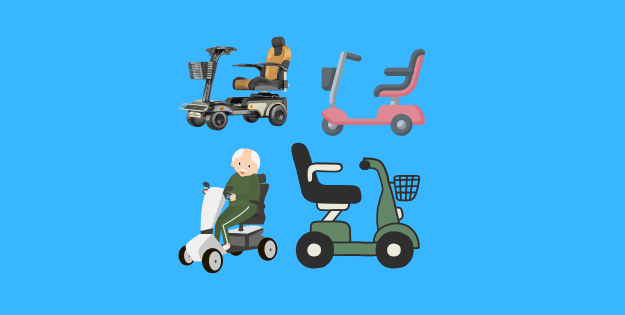Asking what mobility scooter is right for me is an important step in regaining independence, freedom, and mobility. With numerous models available, ranging from compact travel scooters to heavy-duty all-terrain options, finding the right one can be a daunting task. This guide explores the various types, features, and considerations to help you choose the mobility scooter that best suits your lifestyle.
Understanding Mobility Scooters
Mobility scooters are designed to support individuals with limited mobility, providing a comfortable and reliable means of transportation. Whether you need one for short trips to the shop, outdoor adventures, or daily commuting, choosing the correct model will make a huge difference in your quality of life.
When considering which mobility scooter is right for you, it’s helpful first to understand the different categories.
Types of Mobility Scooters
1. Travel Mobility Scooters (Portable Scooters)
Travel scooters are lightweight and designed for easy transport. Many models can fold or disassemble into smaller pieces to fit into a car boot.
Best for: Short trips, occasional use, and frequent travellers.
No products found.
2. Mid-Size Mobility Scooters
These scooters offer more comfort and stability than travel scooters, often with larger wheels and better battery life. They strike a balance between portability and power.
Best for: Everyday use, medium distances, and mixed indoor-outdoor mobility.
No products found.
3. Heavy-Duty Mobility Scooters
Built with robust suspension, higher weight capacities, and larger batteries, heavy-duty scooters are designed for longer journeys and rough terrain.
Best for: Outdoor adventures, larger users, and rural living.
No products found.
4. Folding Mobility Scooters
Folding scooters can collapse into a compact size without needing to be disassembled. They are ideal for those who require frequent access to public transportation.
Best for: Air travel, bus/train commuting, and urban living.
No products found.
5. Road-Legal Mobility Scooters
Class 3 mobility scooters can travel on roads with speeds up to 8mph and include features such as headlights, mirrors, and indicators.
Best for: Longer distances, commuting, and road usage.
No products found.
Key Features to Consider
When deciding what mobility scooter is right for me, keep these features in mind:
- Range – Battery range varies from 8 to 30+ miles. Match this to your typical daily needs.
- Weight Capacity – Choose a scooter that comfortably supports your weight.
- Comfort – Adjustable seats, armrests, and suspension improve long-term use.
- Size & Storage – Consider whether you need a compact model for indoor use or a larger scooter for outdoor journeys.
- Terrain – Pavement models are well-suited for towns, while all-terrain scooters are designed for use on rural or uneven surfaces.
- Transportability – If you frequently need to lift or fold the scooter, opt for a lightweight design.
Mobility Scooter Classes in the UK
In the UK, mobility scooters fall into two classes:
- Class 2 Scooters – Limited to 4mph, designed for pavement use.
- Class 3 Scooters – Road-legal, up to 8mph, with safety features required for public roads.
Knowing which class suits your lifestyle is key when answering what mobility scooter is right for you.
Choosing the Right Mobility Scooter for Health Needs
For Seniors
Lightweight scooters with easy controls are best for older users who need independence but not long-distance travel.
For People with Chronic Pain or Arthritis
Comfortable seating with suspension and adjustable handlebars can reduce strain.
For Active Users
A heavy-duty or road scooter may be better for outdoor travel, errands, and social outings.
Buying Tips for Mobility Scooters
- Test Different Models – Comfort and ease of use vary significantly.
- Check Your Storage Options – Ensure you have space at home to store and charge your scooter.
- Consider Battery Life – Longer ranges reduce the need for frequent charging.
- Set a Budget – Prices range from £500 for simple scooters to over £5,000 for advanced road models.
- Seek Professional Advice – Occupational therapists or mobility experts can help match you to the right scooter.
Real-Life Scenarios: What Mobility Scooter is Right for Me?
- City dweller with a small flat → A folding mobility scooter.
- Countryside resident with long drives → A heavy-duty or road-legal scooter.
- Frequent flyer → A lightweight, airline-approved travel scooter.
- Daily local use → A mid-size scooter for stability and reliability.
Maintaining Your Mobility Scooter
- Charge Regularly – Avoid draining the battery fully before recharging.
- Clean After Outdoor Use – Mud and dirt can damage mechanisms.
- Check Tyres & Brakes – Safety depends on regular maintenance.
- Service Annually – Just like a car, scooters benefit from professional servicing.
Conclusion
If you’re asking what mobility scooter is right for me, the answer lies in your lifestyle, health, and environment. For short, occasional trips, a travel scooter works well. For daily commutes or longer distances, a mid-sized or road scooter may be a better option. Heavy-duty scooters are ideal for outdoor living, while folding scooters are perfect for frequent travellers.
By considering factors such as size, comfort, terrain, and budget, you’ll find the right scooter that enhances your independence and quality of life.

